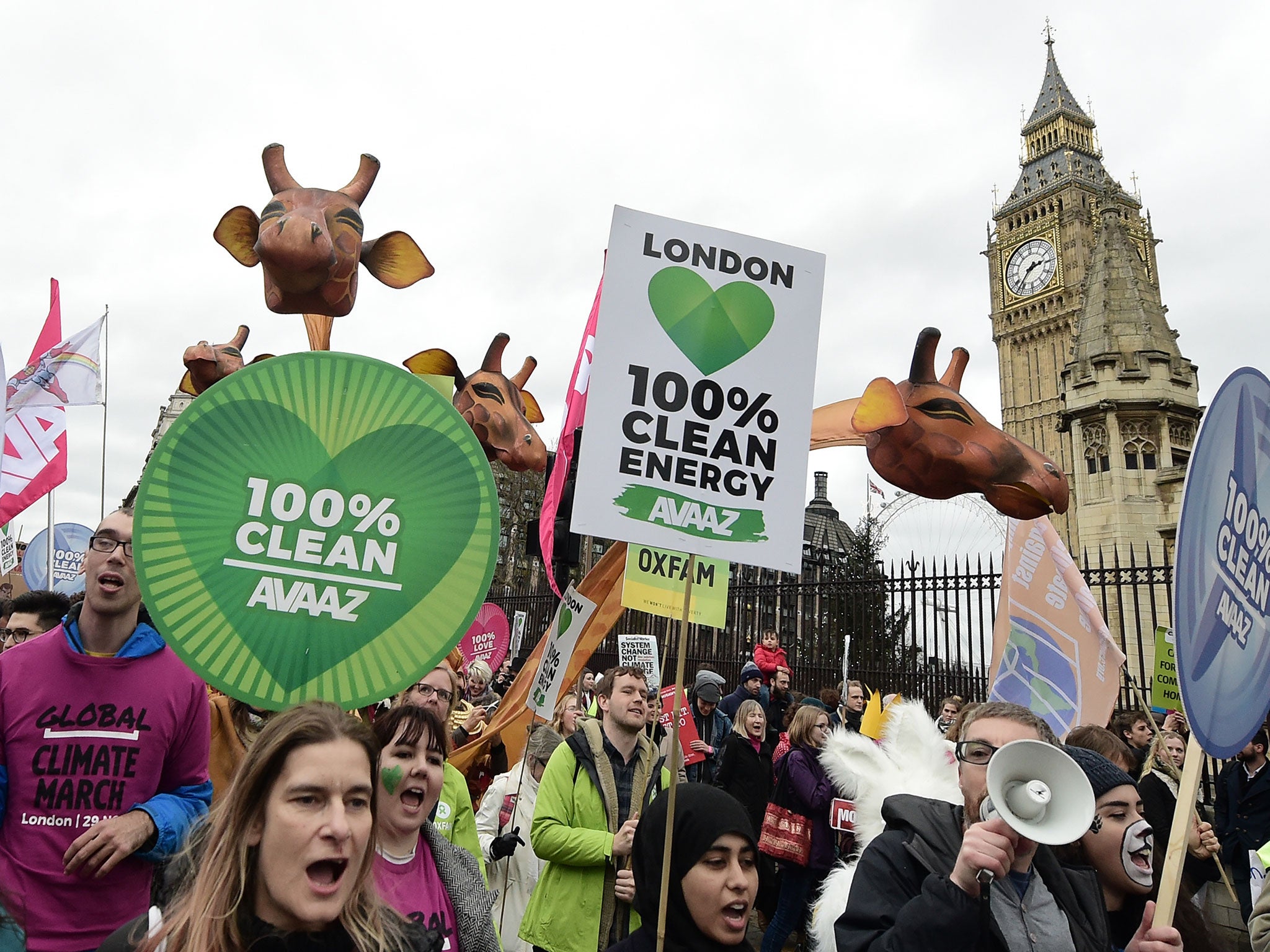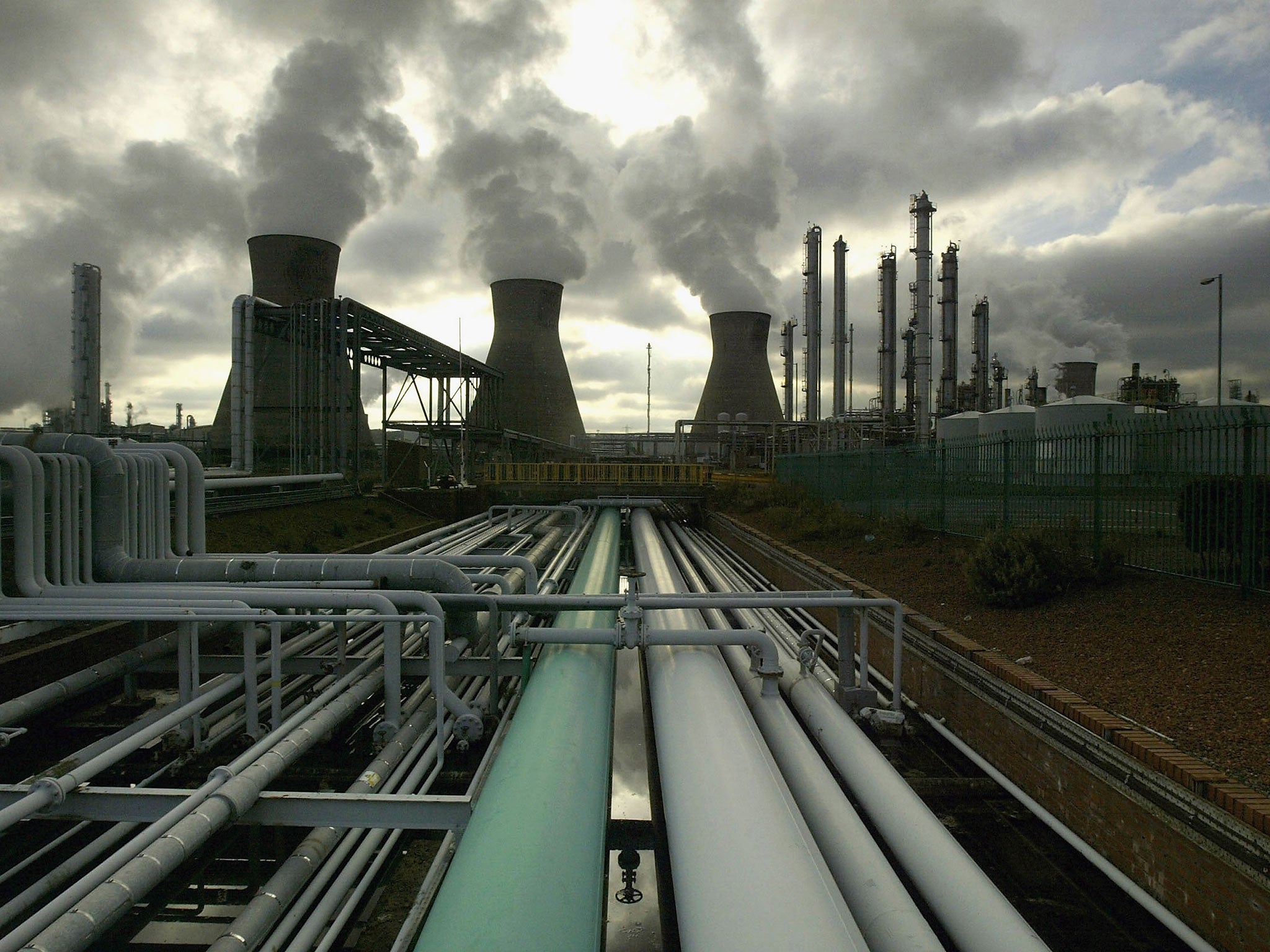Climate change targets 'have huge implications for UK pensioners'
Pension funds urge Britain's biggest carbon polluters to come clean over financial crisis that lies ahead

Britain’s biggest carbon polluters stand to lose billions of pounds from tough new climate targets and must come clean with their shareholders about the financial crisis that lies ahead, the country’s biggest pension funds have warned.
A legally binding agreement struck by world leaders in Paris last month, to reduce greenhouse gas emissions dramatically, has huge implications for pensioners, who have billions of pounds invested in “carbon-intensive” companies.
Analysts say that more than three-quarters of the world’s known coal, oil and gas reserves will have to stay in the ground if the planet is to have any chance of meeting the target to limit global warming to between 1.5C and 2C.
Since fossil-fuel companies are largely valued on their reserves, leaving them in the ground threatens to decimate their profits and share prices. Other heavy carbon producers such as energy providers, steel-makers and livestock farmers are also likely to be hit hard as hefty financial penalties are introduced.

Yet many “carbon-intensive” companies are behaving as though it is “business as usual”, when they should be telling investors what the dangers are and how they are dealing with them. This approach is completely untenable, say pension funds and law firms, now that the Paris agreement has removed any doubt that companies could carry on as normal.
“Business as usual is not an option for very carbon-intensive companies,” said Stephanie Maier, the head of responsible strategy and research at Aviva, the insurance giant that manages £267bn of investments. She also speaks for the Institutional Investors Group on Climate Change, a coalition of 120 financial institutions managing nearly £10trn of funds in nine countries.

Saker Nusseibeh, the chief executive of the BT pension scheme fund manager, Hermes, added: “Companies obfuscate and they need to do more. Paris was so important because it brings the whole discussion from the periphery to the mainstream.”
Britain’s pensioners are also being asked to help themselves by putting pressure on their pension fund managers to find out just how exposed the country’s biggest companies are to climate change, with 19 of the UK’s biggest 100 companies in the natural resource and extraction business, while a further 12 produce vast amounts of CO2.
Meanwhile, local authority pension funds alone own £14bn-worth of shares in fossil-fuel companies.
“I’d like you to ask your pension provider what their policy is in relation to climate risks,” said Steve Waygood of Aviva.
The environmental law firm ClientEarth has made it its mission to compel carbon-intensive companies to detail their exposure to climate change.
“By and large, Britain’s biggest carbon-polluters have been very coy with their shareholders,” said Alice Garton, a lawyer at ClientEarth. “We scrutinised their annual reports last year and found many to be woefully lacking in the kind of information investors need to know about their exposure to these targets.” ClientEarth forced the UK government to take action to tackle air pollution, after taking it to the Supreme Court and winning.

“We will be scrutinising every one of the 31 biggest publicly traded carbon emitters in 2016 to make sure they disclose the full implications of climate change. Unless there is a substantial improvement on last year, it is likely we will be reporting a lot of them to industry regulator the Financial Reporting Council [FRC],” Ms Garton added.
She points to Ivan Glasenberg, the billionaire chief executive of the mining giant Glencore Xstrata, as an example of a fossil-fuel executive playing down the implication of climate change. “We do not believe that the global energy reality will economically support carbon measures that would prevent us from fully utilising our [4.3 billion tonnes of] fossil-fuel reserves,” he said last year.
The FRC has indicated that it will be watching company disclosure of climate-change risk particularly carefully in 2016. “Investors have recently expressed surprise that risks … from climate change are not reported more often as principal risks,” wrote Stephen Haddrill, its chief executive, in a letter sent out to the audit committees of Britain’s biggest companies.
The drive for fuller disclosure on climate risks follows two landmark investigations in the United States by Eric Schneiderman, the New York State attorney general.
The first found that Peabody Energy, the biggest US coal producer, misled the public and its shareholders about the risks climate-change measures could pose to its bottom line. The company has had to inform shareholders that “concerns about the environmental impacts of coal combustion … could significantly affect demand for our products or our securities”. Peabody’s shares have lost half their value in the six weeks since an agreement was reached.
Mr Schneiderman also issued a subpoena to ExxonMobil in November, kicking off an investigation into whether the world’s largest oil company misled investors and the public about the basic science of climate change for decades. Exxon has denied any wrongdoing.
Rhian Kelly, the business environment director at the CBI, said that Britain’s big companies are “used to this type of legislation”, thanks to the introduction of the UK’s Climate Change Act in 2008.
Ms Kelly said that the Paris agreement would require all nations to “take tough domestic action” to curb global warming, and what business needed was for “the Government to send a long-term price signal so firms can get on and invest in low-carbon technologies, especially in diverse low-carbon, affordable and secure energy generation.
“We also need other nations to follow our lead and put in place long-term carbon reduction plans,” she added. “This will help to create a level playing field globally for energy-intensive firms, who will need support to remain competitive.”
A spokesman for Oil & Gas UK, the offshore oil and gas industry association, said: “Oil & Gas UK supports the transition to the low-carbon future and notes the role its members can play in the progressive decarbonisation of our economy.
”This must be done responsibly, in acknowledgement of our continuing need for accessible, affordable and reliable energy. Substituting coal with natural gas in power generation is one of the fastest, lowest-cost and most secure routes to decarbonisation.”
A Shell spokesman said: “Shell has long recognised the climate challenge and the role of energy in enabling a decent quality of life. We welcome the efforts made by governments to cooperatively reach this landmark global agreement [Paris Agreement] and support long-term climate goals that balance environmental pressures with development opportunities.”
A BP spokesman added: “Following the adoption of a special shareholder resolution at this year’s Annual General Meeting, we will include additional reporting next year on the company’s preparations for a lower-carbon future.”
Join our commenting forum
Join thought-provoking conversations, follow other Independent readers and see their replies
Comments
Bookmark popover
Removed from bookmarks